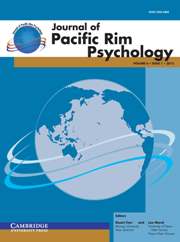Article contents
Integrative Complexity in Correspondence
Published online by Cambridge University Press: 23 February 2012
Abstract
Integrative complexity, the interaction of conceptual and cognitive rules, is used in processing information. High integrative complexity people evaluate situations and make decisions diversely; low integrative complexity people reason simplistically and dichotomously. We examined the social psychology of South/North Korean relations in their correspondence by an integrative complexity coding process. Time series analysis predicted mean levels of integrative complexity for each half-year period between 1984 and 1997. Analysis showed that South/North Korean relations exert significant influence on integrative complexity levels. We also found a mutual effect of integrative complexity levels in the two. Major coordinative events relate to a decline in integrative complexity in the following half-year period. During South Korean presidential elections, correspondence integrative complexity levels decline in both.
- Type
- Articles and Discussions
- Information
- Journal of Pacific Rim Psychology , Volume 1 , Issue 2: Special Issue: Part 1 in a Series of Special Articles , 01 September 2007 , pp. 60 - 69
- Copyright
- Copyright © Cambridge University Press 2007
- 1
- Cited by




